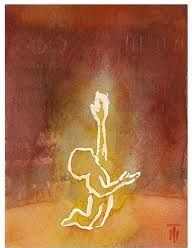Excerpts from as well as Articles & Dialogues on Published & Forthcoming Books
Daily Wisdom: On corporate kindness

Yet, corporations in the end are made up of real people, and real people all have the potential to be lovers.
The following is an excerpt from an acceptance speech made by Howard Schultz, the chairman and chief global strategist of Starbucks.
“When I was in Israel, I went to Mea Shearim, the ultra-Orthodox area within Jerusalem. Along with a group of businessmen I was with, I had the opportunity to have an audience with Rabbi Finkel, the head of a yeshiva there. I had never heard of him and didn’t know anything about him. We went into his study and waited ten to 15 minutes for him. Finally, the doors opened.
What we did not know was that Rabbi Finkel was severely afflicted with Parkinson’s disease. He sat down at the head of the table, and, naturally, our inclination was to look away. We didn’t want to embarrass him.
We were all looking away, and we heard this big bang on the table: “Gentlemen, look at me, and look at me right now.” Now his speech affliction was worse than his physical shaking. It was really hard to listen to him and watch him. He said, “I have only a few minutes for you because I know you’re all busy American businessmen.” You know, just a little dig there.
Then he asked, “Who can tell me what the lesson of the Holocaust is?” He called on one guy, who didn’t know what to do–it was like being called on in the fifth grade without the answer. And the guy says something benign like, “We will never, ever forget.” And the rabbi completely dismisses him. I felt terrible for the guy until I realized the rabbi was getting ready to call on someone else. All of us were sort of under the table, looking away–you know, please, not me. He did not call me. I was sweating. He called on another guy, who had such a fantastic answer: “We will never, ever again be a victim or bystander.”
The rabbi said, “You guys just don’t get it. Okay, gentlemen, let me tell you the essence of the human spirit. As you know, during the Holocaust, the people were transported in the worst possible, inhumane way by railcar. They thought they were going to a work camp. We all know they were going to a death camp.
“After hours and hours in this inhumane corral with no light, no bathroom, cold, they arrived at the camps. The doors were swung wide open, and they were blinded by the light. Men were separated from women, mothers from daughters, fathers from sons. They went off to the bunkers to sleep.
“As they went into the area to sleep, only one person was given a blanket for every six. The person who received the blanket, when he went to bed, had to decide, ‘Am I going to push the blanket to the five other people who did not get one, or am I going to pull it toward myself to stay warm?'”
And Rabbi Finkel says, “It was during this defining moment that we learned the power of the human spirit, because we pushed the blanket to five others.”
And with that, he stood up and said, “Take your blanket. Take it back to America and push it to five other people.”
As our birthdays roll around, year after year, the accumulation of wealth and power seems more and more vapid and ridiculous. At each birthday, we ask with more urgency, “Did my last year have any lasting significance? Did I push my blanket to five people? Have I made progress in the search for a life that matters? Did I make a difference? Did I give something of important to the world? Was I a lover?”
The Erotic and the Holy
Marc Gafni

 “It is written that God withdraws his presence from the world to dwell in the empty space between the Cherubs in the Temple. But how could this be? Is it not also written that all of heaven, indeed all the space in the cosmos, is not enough to contain divinity? “Ah,” says Master Jose. “It is to be likened to lovers. When they quarrel even a palatial home is not enough for their needs, but when they love, they can make their bed even on the edge of a sword.”
“It is written that God withdraws his presence from the world to dwell in the empty space between the Cherubs in the Temple. But how could this be? Is it not also written that all of heaven, indeed all the space in the cosmos, is not enough to contain divinity? “Ah,” says Master Jose. “It is to be likened to lovers. When they quarrel even a palatial home is not enough for their needs, but when they love, they can make their bed even on the edge of a sword.” This spiritual law of the universe plays itself out in many hidden ways which you need to recognize if you truly want to return to love. I want to outline for you areas where, in order to become a lover, you need to give up control. Just as the Hebrew mystics portrayed the God lover as stepping back in order to make space for world, so do we need to step back to create space for our love to flow. First, if we love ourselves, we have to give up our need to be perfect. If you don’t love yourself then you expect perfect self control. If you do love yourself, then you have to allow room for imperfection and failure. Emerson was right when he wrote, “There is a crack in everything that God has made.”
This spiritual law of the universe plays itself out in many hidden ways which you need to recognize if you truly want to return to love. I want to outline for you areas where, in order to become a lover, you need to give up control. Just as the Hebrew mystics portrayed the God lover as stepping back in order to make space for world, so do we need to step back to create space for our love to flow. First, if we love ourselves, we have to give up our need to be perfect. If you don’t love yourself then you expect perfect self control. If you do love yourself, then you have to allow room for imperfection and failure. Emerson was right when he wrote, “There is a crack in everything that God has made.” The pseudo-victim has genuine options which she refuses to action; she refuses to turn fate into destiny and cries more than it hurts. Another kind of pseudo-victim also may have some level of real hurt but more often than not the hurt is more imagined than real and being a victim is a freely chosen role which has many hidden benefits which the pseudo-victim seeks to exploit. The hidden victims of pseudo-victims therefore are real victims.
The pseudo-victim has genuine options which she refuses to action; she refuses to turn fate into destiny and cries more than it hurts. Another kind of pseudo-victim also may have some level of real hurt but more often than not the hurt is more imagined than real and being a victim is a freely chosen role which has many hidden benefits which the pseudo-victim seeks to exploit. The hidden victims of pseudo-victims therefore are real victims.
 There is a tale that educators love about the girl who paints a purple tree. The teacher, who has drawn a tree on the board and asked the children to copy it, is disapproving. “You didn’t copy my tree.”
There is a tale that educators love about the girl who paints a purple tree. The teacher, who has drawn a tree on the board and asked the children to copy it, is disapproving. “You didn’t copy my tree.” In the teaching of Unique Self, the whole/part, autonomy/communion paradox is finally clarified. The Unique Self teaching allows us to create right relationship between whole and part, autonomy and communion. This right relationship is the absolute key to joy, creativity, meaning and peace.
In the teaching of Unique Self, the whole/part, autonomy/communion paradox is finally clarified. The Unique Self teaching allows us to create right relationship between whole and part, autonomy and communion. This right relationship is the absolute key to joy, creativity, meaning and peace. By Marc Gafni
By Marc Gafni
 World Spirituality is not only about coping with life, but about transforming it through mystical realization.
World Spirituality is not only about coping with life, but about transforming it through mystical realization. On MarcGafni.com, a new quote from Dr.
On MarcGafni.com, a new quote from Dr.  In a series of books (e.g., A Sociable God, Up from Eden, and The Eye of Spirit), I have tried to show that religion itself has always performed two very important, but very different, functions. One, it acts as a way of creating meaning for the separate self: it offers myths and stories and tales and narratives and rituals and revivals that, taken together, help the separate self make sense of, and endure, the slings and arrows of outrageous fortune. This function of religion does not usually or necessarily change the level of consciousness in a person; it does not deliver radical transformation. Nor does it deliver a shattering liberation from the separate self altogether. Rather, it consoles the self, fortifies the self, defends the self, promotes the self. As long as the separate self believes the myths, performs the rituals, mouths the prayers, or embraces the dogma, then the self, it is fervently believed, will be “saved”–either now in the glory of being God-saved or Goddess-favored, or in an after-life that insures eternal wonderment.
In a series of books (e.g., A Sociable God, Up from Eden, and The Eye of Spirit), I have tried to show that religion itself has always performed two very important, but very different, functions. One, it acts as a way of creating meaning for the separate self: it offers myths and stories and tales and narratives and rituals and revivals that, taken together, help the separate self make sense of, and endure, the slings and arrows of outrageous fortune. This function of religion does not usually or necessarily change the level of consciousness in a person; it does not deliver radical transformation. Nor does it deliver a shattering liberation from the separate self altogether. Rather, it consoles the self, fortifies the self, defends the self, promotes the self. As long as the separate self believes the myths, performs the rituals, mouths the prayers, or embraces the dogma, then the self, it is fervently believed, will be “saved”–either now in the glory of being God-saved or Goddess-favored, or in an after-life that insures eternal wonderment. In
In